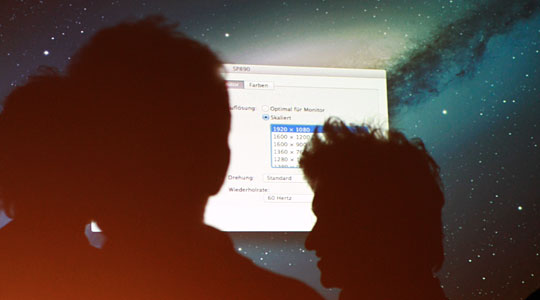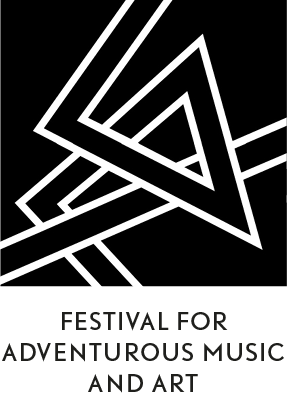Education Networking Day

Scheduled for Saturday, February 1st, 2014 at the HAU Hebbel am Ufer (HAU3), the Education Networking Day invites students, professors, and researchers from different graduate and postgraduate programmes traversing the fields of audio, arts, media, design, and related theoretical disciplines to present their programmes, projects, and research focus in 15 to 30 minute sessions.
Presentation Schedule
12:00 Sound Synthesis Pedagogy at Berklee: BEAP and Eurorack Modulars
Michael Bierylo [US], Berklee College of Music Sound synthesis technologies
All students studying sound synthesis technologies at Berklee College of Music start by using a unique modular software synthesis environment developed by one of our faculty members, Matthew Davidson, AKA Stretta. BEAP, for Berklee Electro-Acoustic Pedagogy, is a collection of MAX B-patcher modules that serve as the building blocks for a powerful virtual modular synthesizer system students use to learn subtractive synthesis techniques into further more advanced topics. The system has evolved into a robust modular platform with well over 100 modules and example patches. Since the system is based on the 1 volt per octave standard of voltage control, it can interface directly with hardware Eurorack modular systems that are also used in the curriculum. We feel this a powerful way for students to learn about synthesis and represents an integrated view of current practice in the field.
12:35 Aalto University - Media Lab Helsinki: presentation of student projects
Nuno Correia [FI], Aalto University, Media Lab Helsinki
Rasmus Vuori (head of the Master of Arts program in New Media) and Nuno Correia (teacher) will present Media Lab Helsinki, a unit of Aalto University's School of Arts, Design and Architecture. The three Master of Arts educational programs within Media Lab Helsinki will be highlighted: New Media; Sound in New Media; and Game Design and Production. Media Lab Helsinki students will then present particular projects, ranging from media art, sound and design to games and social activism.
13:10 Neanderthal Electronics: Teaching Arts and Technology
Derek Holzer [USA/DE, macumbista.net]
"Over the last six years I have developed a workshop program designed to teach art students without in-depth technical backgrounds about basic electronics and instrument building, which has been hosted by several, mainly Nordic schools of art, music and design. During this talk, I will share some observations about the relationship of arts and technology in education resulting from these workshops."
Derek Holzer (*1972) is an American instrument builder and sound artist based in Berlin DE, whose current interests include DIY analog electronics, field recording, media archaeology and the meeting points of electroacoustic, noise, improv and extreme music. He has given almost 200 experimental sound performances, created scores of unique instruments and installations, and taught over 130 sound art workshops across Europe, North and South America, and New Zealand since 2002.
13:30 Break
14:00 Concepts of Discontinuity: Mathematics, Philosophy, Music
"The general aim of my presentation will be to problematize - in the most affirmative sense - the concept of discontinuity. By tracing the concept of discontinuity in mathematics and philosophy I will develop some implications of this year's theme in relation to electronic music and the so-called post-digital era."
Short bio info: Emiddio Vasquez works on philosophy and mathematics. Spends most of his time editing sound, images and max patches.
14:30 StratoFyzika: Exploring Audio, Visual and Movement, through Technology
Alessandra Leone, Hen Lovely Bird, StratoFyzika, Germany
StratoFyzika is a collective creating movement-based interactive audiovisual performances. They research sound waves, visual projection and dance movements connected through interactive technologies as an interdisciplinary way to achieve an aesthetic and sensorial experience where numbers, frequencies and bodies merge into a final equation on stage. Their goal is to create an environment with active elements, where the experience itself transforms your personal attitude about what you think you are able to perceive and leaves your mind distracted with multiple interpretations.
StratoFyzika will speak about their experience in experimenting with movement based audio-visual-performances. The use of sensors and wearable technologies, as translators of one form of energy into another. The body in interactive mediated spaces, as part of a larger system, where movement becomes sound and visuals, that become movement again.
15:05 Performance, Spectacle and Computer Music Interfacing
Jamie Thomas, dBS Music, Berlin, Music Production, Engineering and Electronic Music
After teaching at the Newport School of Art, Media and Design, Jamie now resides in Berlin where he is helping to develop undergraduate courses in Music Production, Sound Engineering, Electronic Music and Performance at dBS music. This short presentation will discuss some of his previous research and its relation to computer interfacing for music performance.
15:30 Break
16:00 Acoustic Scenography, Sounddesign and Architecture
Max Kullmann & Jan Paul Herzer, hands on sound, Berlin
We use sound as a tool and space as a medium. We perceive audible media as a fascinating way to communicate. Euphonic paintings, touchable music, sounding objects and sonic atmosphere: We’re specialized in the audible orchestration of architectural space. We’re specialized in acoustic scenography.
At exhibitions and stores, at events and fairs, inside buildings and in public spaces we put ideas, images or the “bigger context” on stage – with sound. Thereby we aren’t only driven by our knowledge about the power of sound but also by a never ending urge of exploration. With every new project we rethink and reconfigure – no matter if it’s the dilligent acoustic programming of a room or a weird and playful sound installation or experiment. In the process we often cooperate with partners from the fields of scengraphy, architecture and communication.
16:25 Inside the Structure
Paul Wiersbinski, F.A.S.T. (Framing-Art-Science-Technology), HfBK Dresden
Paul Wiersbinski is a student at "F-A-S-T Framing Art, Science and Technology" in Dresden. He will present some works dealing with the use of performative and artistic methods within scientific fields, while connecting historical and political themes within a fictitious scenario.
17:00 Was post-digital better?
Martin Conrads and Franziska Morlok – Berlin University of the Arts
Martin Conrads and Franziska Morlok will present the book War postdigital besser? (Was post-digital better? Eds. Conrads/Morlok, Revolver Publishing, 2014) which features works by around 20 students of the Berlin University of the Arts' Visual Communication department. Originating from a course entitled Postdigital ist besser (Post-digital is better) whichs was composed around the topic of the relationship between the physical and the digital in book making, War postdigital besser? takes a step further by posing this exact question to five selected authors from the fields of media studies and design. The book also includes an edited version of a podium discussion which took place at the opening of an exhibition with the students' works at the Berlin University of the Arts' designtransfer gallery in April 2013.

